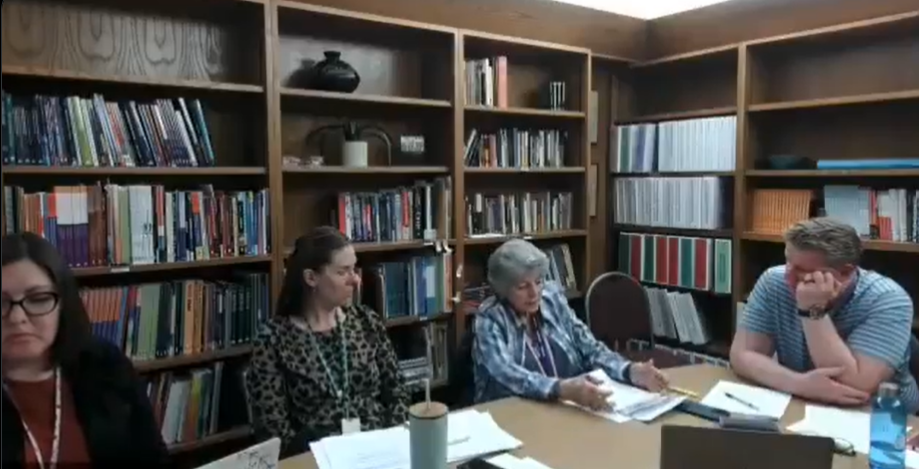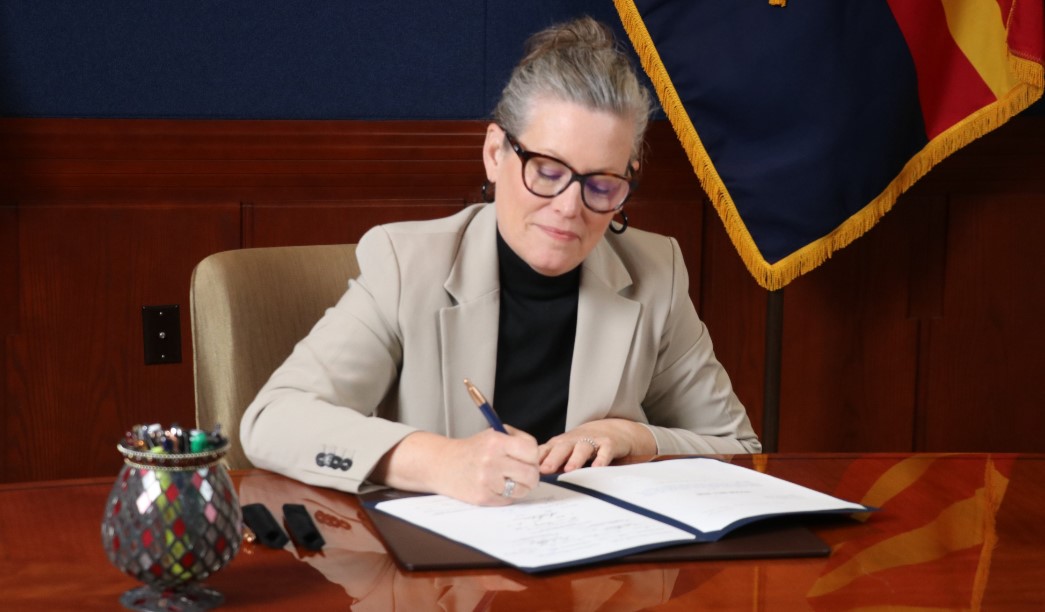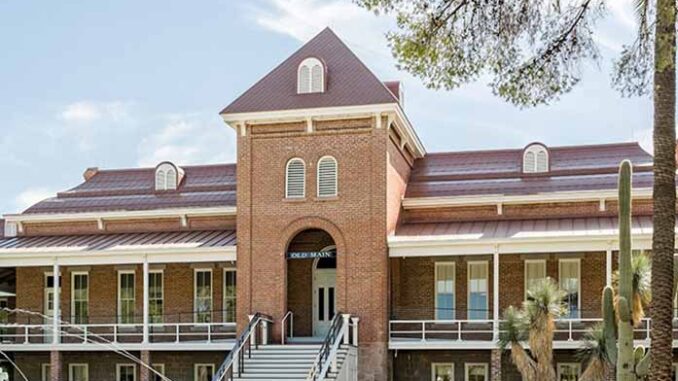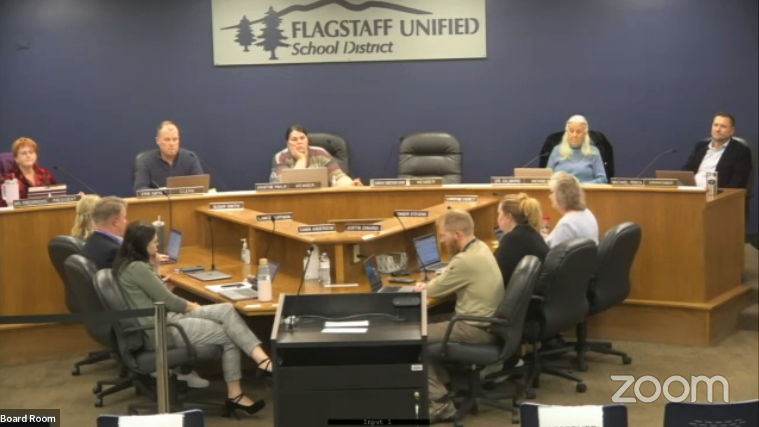
by Staff Reporter | Apr 6, 2024 | Education, News
By Staff Reporter |
Flagstaff schools are gearing to update their sex ed curriculum with material introducing gender ideology.
Gender ideology topics, such as gender identity and transgenderism, would be introduced to Flagstaff Unified School District (FUSD) students as young as the fifth grade, per the district’s ongoing review of its Social/Sexual Health Curriculum for grades 2, 5, 7, 9, and 11.
The district last updated their sex ed curriculum in 2006. As the existing curriculum is nearly 20 years old, the curriculum doesn’t include any discussions of gender ideology; rather, the curriculum clearly distinguishes sex education content between the two genders.
A sexual health educator brought in by the district to advise on the curriculum updates — Sydney Tolchinsky with Coconino County Health and Human Services — told the district in a meeting earlier this year that fifth graders could be transgender and not speaking openly about it. That’s why, Tolchinsky advised district officials, schools should leave it up to the students to pick which classroom they attend to receive their sex education.
Under the existing curriculum, sex education classes for grades 5 and 7 occur in gender-segregated classrooms. Coeducational classes don’t occur until grades 9 and 11.
Tolchinsky further advised the district to get rid of gender-based distinctions in lessons in order to be inclusive of transgender students, such as saying “people who have periods” rather than teaching students that only biological females have periods.
“What we’ve started doing is just not having different lessons, we just have the same lesson in both rooms to be really inclusive of all genders, and trying to change our language, instead of saying ‘girls have periods and boys don’t,’ saying ‘people with a uterus are going to have periods most likely and people without a uterus won’t,’” said Tolchinsky. “Sometimes that might mean a boy might have a period and girls might not have a period for a lot of reasons.”
Failing to have a menstrual period as a biological female is a condition known as “amenorrhoea.” Unless a female is pregnant, breastfeeding, experiencing menopause, or underwent surgery to remove the uterus or ovaries, amenorrhea is a sign of a condition warranting medical attention.
Common causes of amenorrhea include major hormone disruptions caused by emotional stress, extreme weight loss, excessive exercise, or reproductive disorders. Untreated, amenorrhea can present many health risks: reduced fertility, increased risk of cardiovascular diseases such as high blood pressure, increased risk of early onset osteoporosis, and premature menopause and aging.
For males, phallic bleeding may indicate a variety of medical conditions: physical trauma, balanitis, prostatitis, urinary tract infection, ruptured blood vessels, infection, a reaction to medications, or even cancer.
Under Tolchinsky’s suggested teachings, students may believe that conditions like amenorrhea or phallic bleeding are normal and not a cause for concern.
FUSD Assistant Superintendent Lance Huffman agreed with Tolchinsky that gender-neutral language eliminating gender differences would be beneficial.
“We might want to shift to ‘people’ language rather than just boys and girls so some people get periods or people with a uterus may and people with a penis will not,” said Huffman.
Arizona doesn’t require schools to teach sex ed at any level. However, the state does require parents to “opt in” with written permission for all grade levels. Should parents opt out, each individual school provides alternative instruction.
In 2021, the legislature approved a bill requiring, in part, parental consent for discussions of gender ideology in sex ed. Then-Governor Doug Ducey vetoed the legislation, critiquing the bill language as “overly broad and vague,” which the governor said would cause misinterpretations by schools and inhibit child abuse prevention education in early grades.
AZ Free News is your #1 source for Arizona news and politics. You can send us news tips using this link.

by Daniel Stefanski | Apr 6, 2024 | Education, News
By Daniel Stefanski |
A bill to help educate Arizona students about the history of communism met its demise in the Governor’s Office.
On Tuesday, Governor Katie Hobbs vetoed HB 2629, which would have “establishe[d] November 7 of each year as Victims of Communism Day and require[d] the State Board of Education to create a list of recommended resources for mandatory instruction on the topic in certain public school courses” – according to the Arizona House of Representatives’ summary. The bill was sponsored by House Speaker Ben Toma.
In her veto letter back to the Speaker, Hobbs opined that his legislation was “too prescriptive in dictating instructional requirements to education professionals.” She pointed to a bill signed into law in 2022, which was sponsored by State Representative Nguyen, as the “appropriate process to modify academic content as it ensures that changes to standards are evaluated by experts in a holistic manner across grade levels, and the public is provided with ample opportunity for review and input.” The Democrat governor “strongly urge[d] the State Board of Education to take action to begin the process of updating the Social Studies Standards and address the issues covered in this legislation.”
Hobbs did promise to “proclaim this November 7 as Victims of Communism Day in sharing the spirit of this Legislation.”
Speaker Toma was outraged by the governor’s action. In a statement following the veto, he wrote, “I find Governor Hobbs’ veto of HB 2629 both indefensible and personally offensive. Having lived under the oppressive regime of communist Romania, I have firsthand knowledge of the devastating impact these ideologies have inflicted on billions worldwide. Communism’s legacy is marked by death, oppression, deprivation, economic suffering, and the shredding of all that binds families and communities together. It is a history that must be remembered and taught, not dismissed, ignored, or vetoed.”
Toma added, “The Governor’s veto and the limited bipartisan support for HB 2629 reflects a deeply concerning trend where the education of our students on fundamental historical truths is becoming a partisan issue. This should not be a matter of politics, but a matter of ensuring our future generations are well-informed, critical thinkers who appreciate the freedoms they have. Sadly, Governor Hobbs has denied Arizona students a crucial opportunity: to learn from the past and understand the sacrifices of those who suffered under communist regimes.”
The speaker concluded his statement by addressing Hobbs’ suggestions and promise, saying, “While I respect the Governor’s gesture to revise our state’s Social Studies Standards, I simply do not trust her administration’s ability or willingness to accurately reflect communism’s legacy. The academic requirements must be codified in statute, as my bill would have done.”
Daniel Stefanski is a reporter for AZ Free News. You can send him news tips using this link.

by Elizabeth Troutman | Apr 5, 2024 | Education, News
By Elizabeth Troutman |
The University of Arizona is getting a new president.
University President Robert C. Robbins told the Arizona Board of Regents on April 2 that he will step down by the end of his current contract as soon as his successor is ready.
“After significant consideration and personal contemplation, I informed the regents this morning that I will step down as president of the University of Arizona after fulfilling the terms of my current contract,” Robbins said in a statement. “When a new president has been appointed by ABOR and she or he is prepared to start sooner than the end date of my contract, I will ensure a smooth transition to my successor and step aside earlier.”
Robbins has served as president since 2017. He has been under fire over the last six months because of the university’s $177 million deficit.
“The University of Arizona has and will continue to tackle the more pressing challenges of our time,” Robbins said. “And it is time to begin to think about what is next for the university, and I will continue to serve the institution with pride and work with ABOR to ensure a smooth transition at the appropriate time.”
Arizona Board of Regents Chair Cecilia Mata said the board plans to start a national search for the 23rd president of the university soon, and Robbins will serve as president until his successor is ready to start. His current contract expires June 30, 2026.
As president, Robbins oversaw the creation of the new Center for Advanced Molecular and Immunological Therapies, as well as the largest fundraising campaign in the university’s history, Fuel Wonder, which has raised $2.2 billion toward the $3 billion goal.
“The University of Arizona has a long-standing reputation as an elite public research university – one with a rich tradition of service and a leader in advancing new frontiers and making remarkable discoveries,” he said.
Robbins said this is a difficult but necessary decision. He said he has no doubt the university is in good hands.
“It has been a true honor to lead the University of Arizona for so many years, particularly during a time of transformational change in higher education and with challenges in the world around us,” he said. “I am proud of the many advancements we made together in elevating the institution, by enhancing the student experience; by attracting and retaining world-class faculty and staff; by increasing our research funding and philanthropy; by achieving significant milestones in science, astronomy and medicine, among many other disciplines; by engaging our indigenous tribes and rural communities; and by improving the lives of Arizona residents and the global community.”
Mata said the board appreciates Robbins’ dedication to UA’s mission and values.
“He has built a legacy of commitment to student access and success, as well as advancement of the university’s land-grant mission,” she said. “President Robbins implemented a strategic plan focused on the opportunities and challenges presented by the Fourth Industrial Revolution. His keen ability to weave together the biological, digital and technology sectors to further advance the mission of the university has led to exceptional accomplishments.”
Elizabeth Troutman is a reporter for AZ Free News. You can send her news tips using this link.

by Elizabeth Troutman | Mar 31, 2024 | Education, News
By Elizabeth Troutman |
A Flagstaff elementary school posted fliers for an LGBT “name change clinic” at its elementary school.
DeMiguel Elementary School in the Flagstaff Unified School District advertised one•n•ten’s legal name change clinic, which offers to help minors change their legal name for their “transition,” the Daily Signal reported.
“Are you a trans or gender nonconforming individual and need help legally changing your name?” the poster says. “We are collaborating with One-N-Ten and the Northern Arizona law firm of Aspey Watkins & Diesel, PLLC to host a hybrid (virtual & in-person) Name Change Clinic, with 1-1 legal consultation!”
LGBT youth organization one•n•ten provides LGBT programs to minors as young as 11 years old. One•n•ten “envisions a world where all LGBTQ youth and young adults are embraced for who they are, actively engaged in their communities, and empowered to lead.”
Programs at one•n•ten include “SexFYI!,” a monthly sexual health program for ages 14 – 17 and 18 – 24 “that is inclusive of their body, gender identity and sexual orientation, including fluidity therein.”
In a Feb. 26 meeting, the district also proposed “updating” the verbiage in official district policies from “boy/girl” to “people,” allowing students to attend sex education classes designed for the opposite sex, and updating curriculum to be more “inclusive” of gender-fluid ideology.
School board president Christine Fredericks responded to parental complaints, saying “Bring it on.” She told parents she would “never apologize for being inclusive.”
Peoria Unified School District Governing Board member Heather Rooks posted on X that Fredericks’ indifference about parental rights should inspire Arizonans to prevent her reelection.
“Parents, it’s time to “Bring it on” in November,” she said. “Vote these people out!”
Elizabeth Troutman is a reporter for AZ Free News. You can send her news tips using this link.

by Staff Reporter | Mar 29, 2024 | Education, News
By Staff Reporter |
Arizona Republican lawmakers and concerned parents won a recent victory to protect the state’s universal school choice program from a volley of new regulations.
Over this past weekend, Arizona legislators were involved in a battle over the Draft Parent Handbook for the ESA Program for School Year 2024-2025. Unbeknownst to many ESA families, the handbook was posted to the Arizona State Board of Education’s website – linked to an agenda item – with multiple proposed changes of a significant nature, giving interested parties mere days to leave feedback. The recommendation from the Department was for the State Board of Education to adopt the revised handbook when it convened on Monday, March 25.
A group of parent-stakeholders, led by a long-time watchdog of the ESA program, Christine Accurso, discovered the existence of the handbook and poured through its contents, finding numerous examples of added regulations for students and families. They compiled the list and notified as many other parents as possible.
The parents also reached out to Republican lawmakers, who were shocked to learn about the lack of transparency and the efforts to overregulate the program, which was contrary to the legislative intent. Senators Jake Hoffman and Wendy Rogers, among others, immediately sprang into action to stop the revised handbook from becoming Department policy.
Thanks to the legislators’ and parents’ involvement, the State Board of Education ultimately reversed course on its initial recommendation, voting to maintain the previous year’s handbook with no changes.
Save Our Schools Arizona Director Beth Lewis, who has been a staunch opponent of the ESA program, was extremely disappointed with the outcome from the State Board of Education. After the Board’s vote, she said, “The proposed regulations rejected by Supt. Horne and Republican lawmakers would have provided a thin veneer of oversight for Arizona taxpayers.”
One of the ESA parents, Kelly Kenney, told AZ Free News, “I was shocked about the increased regulations because the new handbook changes will limit the educational opportunities for my child. This would directly impact her access to the type of resources that she absolutely needs. If the ESA program was supposed to be regulated in this way, it would spell it out in the statutes. I’m very glad the State Board saw things our way and sided with the parents in this program.”
The Arizona Department of Education’s “X” account issued a short statement following the vote from the State Board, writing, “Superintendent Horne is thankful for Senate President Warren Petersen and Arizona Senate Republicans for helping garner support from the state board of education to allow more time for input from parents on the ESA handbook.”
In the days leading up to the State Board of Education meeting, Republican legislators had several conversations with individuals at the Arizona Department of Education, informing them of their displeasure with this action and holding them accountable to the original intent of the ESA law. To ensure that ADE understood the seriousness of the situation and the resolve of legislative Republicans, Senator Jake Hoffman wrote a letter to the State Board, which was signed by many of his colleagues, including Senate President Warren Petersen and House Speaker Ben Toma.
The letter stated that ADE’s “proposed changes restrict[ed] the program further than the Arizona State Legislature intended.” It also highlighted “the failure to allow for public engagement, comment, or input in the shaping of these new regulations,” calling this “incredibly concerning.” Two requests were made of the State Board of Education in this communication. The first was to reject the draft handbook and greenlight the 2023-2024 handbook for another school year. The second was to “form a stakeholder working group consisting primarily of ESA parents, private school administrators, and home schooling parents” for the 2025-2026 handbook.
In an exclusive comment to AZ Free News, Senator Hoffman explained why he took the lead against the proposed changes in the draft ESA handbook. He said, “Transparency and robust public input from those most impacted by these regulations are critically important. Unfortunately, the system failed the Arizona families who rely on empowerment scholarship accounts for the educational success for their children. Thankfully Superintendent Horne and the State Board of Education took the opportunity to remedy this failure. Their decision to reject the deeply flawed 2024-2025 handbook, and instead adopt the current handbook until ESA families and educational providers have a multi-month opportunity to engage with ADE staff on the next handbook was the right move for the children relying on this incredible program.”
Just before the legislators’ letter was delivered to the State Board of Education on Friday evening, the ESA Executive Director wrote an email of his own to ESA families with the “ESA Program Response to Misinformation.” The director stated that “incorrect information has made it into the public dialog regarding payment of ESA purchases…that ESA account holders will not be paid for their allowable purchases until after they have completed an educational program.” The director also noted that the draft handbook had been posted on the State Board of Education’s website since Friday, March 15. Sources told AZ Free News that the alleged complaint was one that they had not seen lodged against the draft handbook and that none of the other concerns brought by parents about proposed changes in ESA policy or guidance were addressed in the director’s email.
The director’s email to ESA families on Friday, March 22, was believed to be the first since January 24, when the program sent an “important update on new features from ClassWallet.” The director had previously sent three consecutive emails to families in late-December 2023. In one of those emails, the director asked parents to submit their “suggestions for specific changes…to [be] made to the ESA Parent Handbook.” The deadline for submissions was January 2, 2024 – four days after that email hit inboxes.
Another ESA parent, Rosemary McAtee, gave the following comment to AZ Free News: “I was appalled to learn how the education department was trying to slide a new handbook past the parents, to the state board, without any input from the parents. I am glad that members of the board voted to include us in the process by allowing more time for our input. This week was a win for ESA parents! I’ve been in this program for 5 years and every year there has been a public process. We really haven’t heard anything at all from the department in the past 7 months when we were accustomed to weekly email updates.”
Solicitation of public comment on changes for the 2024-2025 Draft ESA Handbook was handled much differently – and with less transparency – than the previous year’s redlines. Last year, ADE issued a press release and transmitted an email to ESA account holders to explain the proposed changes.
The uproar over the draft handbook follows another instance where a Republican legislator was forced to intervene in an issue raised by parents. In February, ESA parents asked Rogers to resolve the backlog of orders in the program, which was believed to be around 85,000 (or over four months old), according to sources. AZ Free News was made aware of at least one Arizona private school that experienced severe funding issues due to the lack of reimbursements for ESA students who attended.
After Rogers contacted ADE with her concerns and request to pick up the pace of reimbursements, the issue almost literally evaporated overnight. AZ Free News was told that thousands of orders may have been approved in mere hours – and many more followed in the following days.
In an interview with AZ Free News, Rogers explained why she chose to involve herself over the stockpile of orders from ESA families, saying, “Numerous constituents, including family members had become exceedingly frustrated at the slow turnaround time for reimbursements from the ESA program. People from all over the state wrote me. They know that I fight, and that I’m outspoken. So I began writing terse letters to the Arizona Department of Education and I got results for my people on an individual basis, one by one. Then the word got around among the ESA families and everyone began to write me. So I started inundating the department with these letters, every one of which was carefully and separately written in-depth describing how these reimbursement delays adversely impacted their ability to school their children.”
The rural Arizona state Senator added, “Then all of the sudden, I heard that thousands of ESA reimbursement approvals were done over one night with no scrutiny. This is not a way to run a business. This just feeds the controversy on whether or not expenditure approvals are correct or valid. The ESA program was running well last year. I heard from many families how well run it was. Now it has run amok. There is no excuse for it. It must be repaired. Our children are too important. The legislature put this ESA program in place and now it’s up to administrators to manage it properly.”
The former director of the ESA Program, Christine Accurso, was at the center of both episodes, continuing to be a sounding board for hundreds of parents and an effective liaison to the Republican-led legislature on behalf of stakeholders. After the positive action from the Board on Monday morning, Accurso wrote, “Superintendent Horne committed to having his team work with key stakeholders – mainly parents – in creating the next one. Many Republican lawmakers stepped up to help their constituents, after receiving hundreds of emails this past week, and their advocacy paid off. As an advocate, defender and watchdog of this program for the past 10 years, I am so glad to see this outcome. This is exactly what we wanted and needed to have happen. The parents who attended and spoke at the board meeting did a great job advocating for their children’s education.”
When Accurso inherited the ESA Program in January 2023, there were over 60,000 orders for marketplace, direct pay, and reimbursements. Even with a steady increase of new enrollees adding a significant amount of orders to the existing backlog, Accurso and her team managed to whittle the requests down to essentially ‘zero,’ and drastically minimize the delay in response time to parents.
AZ Free News is your #1 source for Arizona news and politics. You can send us news tips using this link.

by Elizabeth Troutman | Mar 28, 2024 | Education, News
By Elizabeth Troutman |
Arizona State University’s business school is launching a Master of Science in Artificial Intelligence in Business degree. Applications for fall 2024 admissions are now being accepted.
The school announced Monday that the W. P. Carey School of Business will present the first AI graduate degree program from a business school in the United States.
“There is no doubt that AI is quickly becoming a vital business skill. We are excited to meet the needs of students and employers through our new graduate degree program within our top-ranked information systems department,” said Ohad Kadan, Charles J. Robel dean and W. P. Carey distinguished chair in business.
The program will be held on the Tempe campus. It incorporates an applied curriculum and career coaching.
The degree aims to help students develop technical AI and professional skills needed to thrive in the technology and business world.
“Students will learn to understand and plan for the implications and possibilities enabled by artificial intelligence, in addition to the importance of governance, ethics and principled innovation,” said Pei-yu Chen, chair of the Department of Information Systems and Red Avenue Foundation professor. Chen also serves as the co-director of the Center for AI and Data Analytics for Business and Society.
Students in the program will learn to analyze diverse business situations and apply AI to further business goals; understand and effectively communicate the impact of AI transformations; practice mindful AI and pay attention to ethics, bias, welfare, privacy and trust; and lead cross-functional conversations and collaboration for effective implementation.
“W. P. Carey has been at the forefront of integrating AI into its academic programs, showcasing a commitment to leadership in AI education and its applications in business,” said Dan Mazzola, faculty director of the MS-ISM program. “The school’s offerings of AI-focused degrees, alongside various AI-related certificates and concentrations, highlight its active role in shaping the conversation around AI and fostering innovation and entrepreneurship in technology.”
W. P. Carey also offers a certificate in artificial intelligence in business. Credit completed in the certificate program can later be transferred toward several W. P. Carey master’s degrees.
Elizabeth Troutman is a reporter for AZ Free News. You can send her news tips using this link.






